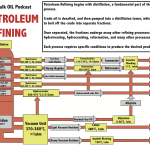This is the ES-101 Podcast made by Scott Oliveri, Munyaradzi Chifetete, and Campbell Weyland.
This podcast focuses on the petroleum refining process.
Join the handsome trio of Craig Strand, Graham Baker, and Lloyd Bentley as they take a few calls and answer this vital question posed by everyday americans:
How does crude oil become our everyday petroleum products?
This podcast goes in depth in the various important processes required to separate and refine crude oil into products like gasoline, motor oil, and asphalt.
Happy listening!

I like this a lot!
Is it harmful to have heavier fractions in the gasoline, or is it just not as economically beneficial?
Gasoline mixed with heavier fractions do not run as well, and do not have a high octane count. Heavier fractions are repurposed into other products, while the gasoline is furthered refined and modified.
If inhaled, gasoline fumes can be harmful, and adding heavier carbon compounds into the mix would certainly not help.
It is in a company’s interest to separate heavier fractions from gasoline, not just because it fetches a higher price, but also because it does make the gasoline safer.
Extremely entertaining and funny while still being very informative! Great job guys!
The information was very thorough and while the topic is pretty heavy (information wise), you guys kept it interesting and humorous.
Great work you guys!
This podcast has a lot of good information and was very well thought out. I did not know that the lighter fractions were the most valuable, but it makes sense now that I think about it.
I think its also very interesting that they are trying to make the process more efficient by extrapolating even more light fractions from the residue by breaking up chain molecules (although this process sounds very complex!).
Too bad I can’t hear more about the pink menace!
Definitely entertaining. I’m very impressed you were able to provide so much information, keep it entertaining, and still keep it so short.
It’s strange to think that cars run on a form of petroleum, have components made of it, and use another form as a surface to run on.